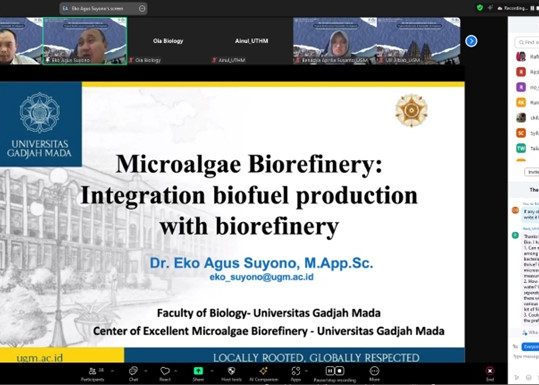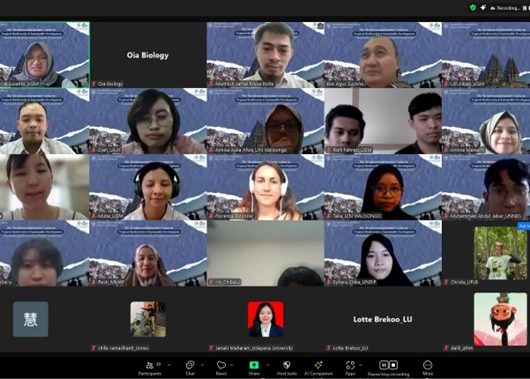Yogyakarta, 19 July 2024 – As part of the 2024 7th International Summer Course in Sustainable Development lecture series, the online lecture session continues after the previous lecture series on Wednesday (17/7) with researchers from Nottingham University. In this series, we present a microalgae expert from the Faculty of Biology, Universitas Gadjah Mada, Dr. Eko Agus Suyono, M.App.Sc. which carries the topic of microalgae biorefinery, in accordance with the theme promoted by ISC this year “Sustainable Bioprospecting of Tropical Biodiversity”.
Dr. Eng. Thoriq Teja Samudra, one of the lecturers at the Biotechnology Laboratory, Faculty of Biology, UGM, acted as moderator this time. He introduced Dr. Eko is one of the researchers in the same laboratory and also the inventor of various innovations related to microalgae. His research collaborates with various sectors and researchers from other fields such as chemical engineering.
Dr. Eko explained his presentation entitled “Microalgae Biorefinery: Integration Biorefinery and Biofuel”. The scarcity of fuel from petroleum over time has become one of the backgrounds for the development of microalgae biofuel. In addition, commonly used fossil fuels cause an increase in CO2 concentrations in the atmosphere, which is one of the triggers for climate change. Microalgae have great potential as biofuel, which is able to supply energy to produce biofuel while reducing CO2 levels in the atmosphere which is used in the photosynthesis process.
Apart from its potential as an alternative fuel, microalgae provide other bio prospective potential including cosmetics, potential food, and so on. Dr. Eko added that the extracted and purified algae biomass will produce various potential sustainable products: food, biodiesel, fertilizer, animal feed, chemicals and so on. This makes a major contribution to various sectors ranging from food security, health, energy, to tackling climate change.
The summer course participants were enthusiastic in attending all the lectures, it is hoped that through these activities students can contribute to innovation in the development of sustainable research products while maintaining the balance of the ecosystem and biodiversity within it.




